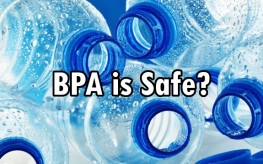Critics say study is flawed to the point of being worthless
Elizabeth Renter
Infowars.com
March 1, 2014
 Despite countless studies showcasing the many dangers of the plastic chemical bisphenol-A (BPA), the Food and Drug Administration has insisted for years that BPA is safe. Now, the organization has released a study that it says affirms this, though critics say the study is flawed to the point of being worthless.
Despite countless studies showcasing the many dangers of the plastic chemical bisphenol-A (BPA), the Food and Drug Administration has insisted for years that BPA is safe. Now, the organization has released a study that it says affirms this, though critics say the study is flawed to the point of being worthless.
According to Environmental Health News, the research exposed rats in the womb and as newborns to high levels of BPA and found it resulted in altered hormones, lower body weights, and abnormal female reproductive development. But, when the rats were exposed to lower levels—levels the FDA said are equivalent to those experienced by humans—no such effects occurred.
“It’s a flawed study,” said Laura Vandenberg of the University of Massachusetts Amherst. Vandenberg isn’t alone in her opinion, that the FDA’s study is scientifically unsound.
Vandenberg said the main problem with the study was that all of the rats were exposed to BPA. The group of rats meant to be the control group had traces of BPA found in their blood at about the same level of those rats who intentionally received the BPA.
This sort of contamination should render the study useless. But the FDA says it doesn’t. A spokesperson for the agency said that although the “source of this exposure could not be identified…interpretation of the toxicological effects, observed only at the highest BPA doses, was not compromised.”
“That’s a problem. When you have contamination like that, you cannot just look at the higher-dose groups and make conclusions,” says Vandenberg.
In addition, the study didn’t take into account the effects of BPA on human hormones, perhaps one of the most documented risks of BPA exposure. And that isn’t all; the study didn’t look at neurological effects and was limited to only 90 days—far shorter than the average human life span.
“What needs to follow is whether these exposures are causing neurobehavioral changes. Other research hints that animals exposed to BPA show increased anxiety, and we see similar results in children whose mothers were exposed,” said Joe Braun, epidemiologist and visiting scientist at Harvard University.
Other studies have linked low BPA exposure to a myriad of health concerns including abnormal sexual development in males and females, metabolic changes, impaired memory and learning, stress, insulin and glucose abnormalities, and obesity.
More than 90% of Americans have trace amounts of BPA flowing through their veins, exposed the the toxin through food containers, plastic bottles, and even dental sealants. While the FDA would have you believed their flawed 90-day study proves without a doubt that this BPA is completely safe, years of conflicting research says otherwise.
This article first appeared at Natural Society.com.
The Emergency Election Sale is now live! Get 30% to 60% off our most popular products today!


